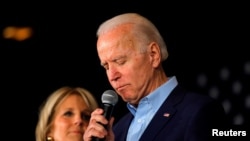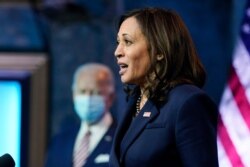Democrat Joe Biden will realize the ultimate ambition of his lengthy political career on Wednesday when he takes the oath of office at the U.S. Capitol to become the 46th U.S. president.
The theme of the inauguration will be “America United,” reflecting the beginning of a “new national journey that restores the soul of America, brings the country together and creates a path to a brighter future,” according to the Biden-Harris inaugural committee.
But it took the former vice president and senator from Delaware three tries before he finally won the presidency in November. And his final road to the White House proved to be rocky and strewn with unprecedented obstacles.
Biden, 78, was faced with a coronavirus pandemic that sidelined much of his traditional campaigning and forced him to sequester in his Delaware home for much of the campaign.
While touted as the early Democratic frontrunner, Biden stumbled from the start, delivering less-than-stellar debate performances and losing badly in early primary election contests. Finally, as his party’s nominee, he was locked in a brutal general election campaign against Republican President Donald Trump, mocked by Trump as “sleepy Joe” and denounced for policies and his son’s business dealings.
Biden announced his candidacy on April 25, 2019 and he was considered the early front-runner in the Democratic nominating contest.
From the early days of the campaign, however, the former vice president struggled to garner enthusiasm from voters and was soon overshadowed by larger personalities on the campaign trail. There were calls from some Democrats for the party to nominate a candidate who was younger, more liberal and who better represented the growing diversity of America.
Biden was nearly counted out of the presidential race after losses in the first three nominating contests in Iowa, New Hampshire and Nevada, where he placed 4th, 5th, and a distant second, respectively. However, top Democratic officials rallied behind Biden after his win in the South Carolina primary where he received strong support from African American voters and emerged as the clear moderate alternative to progressive candidate Bernie Sanders, the Vermont senator.
Just as it became clear in early March that Biden was again the strong front-runner for the Democratic nomination, his campaign was mostly grounded by the global coronavirus pandemic that unexpectedly and swiftly shut down much of the world.
While Biden eventually returned to a modified campaign trail, he chose to convert many planned rallies to virtual or drive-in events during the general election, in which he faced off against Trump. The president did not make the same decision and continued to hold large, in-person events.
The coronavirus also led to a large number of mail-in ballots for the November 3 election, which in conjunction with close races in several states, slowed down the vote tally and delayed the announcement of Biden as the winner for several days.
President Trump used the delay to bolster his unsubstantiated claims of widespread voter fraud and continued to press his claims through the end of his term, culminating in January, when a mob of pro-Trump supporters stormed the U.S. Capitol to delay the certification of Biden’s win. The attack was an unprecedented assault on the seat of U.S. legislative power and led Biden to describe the mob as “domestic terrorists.”
Here’s a timeline of key events:
April 25, 2019: Biden declares he is running for president, one of more than two dozen Democratic candidates seeking to defeat President Trump.
February 22, 2020: Biden loses the Nevada Democratic primary, after primary losses in Iowa and New Hampshire, and is nearly counted out of the presidential race.
February 29: After winning the South Carolina primary, Biden consolidates the support of Democratic Party leaders and becomes the front-runner for the party’s nomination.
March 3: Biden wins the most number of states in the numerous Super Tuesday primaries, taking the lead in the delegate count and further solidifying his front-runner status.
Spring 2020: The coronavirus pandemic forces Biden to hunker down in his Delaware home for much of the spring, sidelining many of his campaign plans.
June 5: Biden wins enough delegates to secure the Democratic presidential nomination.
August 11: Biden picks California Senator Kamala Harris as his vice presidential running mate, making her the first African American woman on a presidential ticket.
August 20: Biden accepts the Democratic presidential nomination during the party’s convention, held virtually because of the pandemic.
Fall 2020: Biden engages in a pared-down campaign schedule because of the coronavirus, converting many of his rallies to virtual or drive-in events.
November 3: Election Day passes without a presidential winner called because of close races in several battleground states and delayed vote counting due to high numbers of mail-in ballots.
November 7: Major U.S. news outlets declare Biden the winner of the presidential race despite unsubstantiated claims of voter fraud by President Trump.
December 14: The Electoral College cements Biden’s win and the president-elect calls Trump’s attempts to overturn the election an “abuse of power.”
January 6, 2021: A mob of pro-Trump supporters storms the U.S. Capitol, delaying the congressional certification of Biden’s win. Biden describes the mob as “domestic terrorists.”
January 7: Congress certifies Biden’s presidential win.
January 20: Biden to be inaugurated president of the United States.







